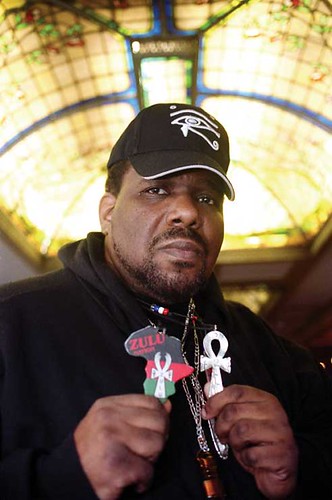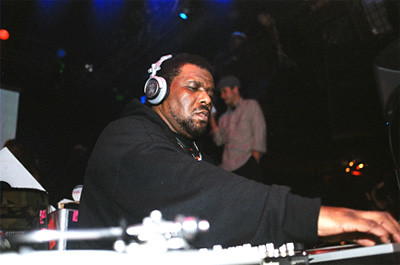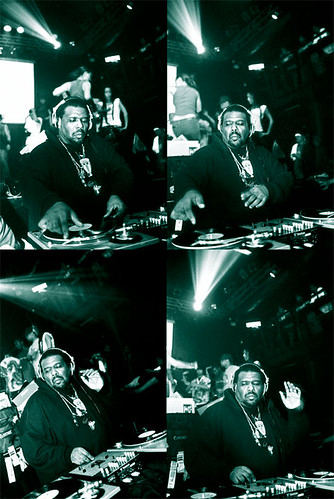Afrika Bambaataa
Interview By Bella Bakrania, Bayeté Ross-Smith, & Eddie Mariano
Though hip-hop may be a child of many parents, Afrika Bambaataa taught hip-hop its first steps as a movement. Not long after Kool Herc first put two turntables together, Bambaataa used the music to bring rival communities together. To this day, hip-hop’s original gangsta continues to prove that music can be a catalyst for peace, unity, and social change.
Bella Bakrania: It’s always a pleasure and kinda crazy to hear all the ‘80s tracks rocking the younger crowds once again. How do you feel about that, with your span in hip hop and being able to rock these crowds of many different generations?
Afrika Bambaataa: So many deejays have gotten into the apartheid of becoming a deejay. They say, “I am a ragga deejay, I am a hip-hop deejay, I am a trance deejay, I am a salsa deejay,” instead of just One Nation Under a Groove like George Clinton say. I remember when the techno scene was happening big and the early raves started, I used to go there and there would be 20 something deejays and they all sound the same, so I used to come and break the whole momentum, with REM “Losing My Religion” and going down to some funk and bringing it all the way back up to techno for the next deejay to take on. I was always like that. Trying to bring a whole bunch of records out and play all across the board. Trying to keep that dance scene alive in all styles of music since all music is really dance music. Everybody has got all caught up – “Dance music is only techno or house music”. No, all music— if you can dance to it—is really dance music.
BB: Tell us about your new album out—Dark Matter Moving at the Speed of Light [Afrika Bambaataa and the Millennium of the Gods]—about putting it together and the people you worked with.
It took 3 years in the making. I worked with a lot of these other great recording artists who are also producers that I enjoy a lot. Like Uberzone, Sharaz, Strictly Jeff, Boogie Brown—who was part of my group Hydraulic Funk and also used to be part of the Peech Boys back in the days— and a new young producer coming up DJ Hektek, Dukeyman from the Baltimore Breakbeats, and Gary Numan. It was great honor working with Gary Numan; it was just fun working with all these guys... And a new production team called Fort Knox Five. If you see their records, jump on them ‘cuz all their stuff is slammin’. It was great working with all these people putting out an Electro-Funk album because people were asking for it. I’ve been doing techno, hip-house, flamingo, so I had to come back and do my roots: up-tempo hip-hop.
BB: The album starts out with a tribute to the Indian musical influences. That’s a nice nod to the heavy music production that happens across the world, and has been happening, but people don’t necessarily know about it or tune in to it. Do you play much multi-lingual hip-hop?
Most definitely. I have been playing hindi/punjabi mixes for a long time. I got all the movies and they love it in Africa—the roots of India is Africa too—it’s all one family, we all come from the drum. I play everything. France to Indian style. Spanish to Italiano. There’s different music that I play from different people, sometimes with the instrumentals, sometimes with the languages. In L.A. we was killin’ the hindi remix of Dr. Dre. I went down to Singapore they were going crazy with the hindi mixes.
We got to always respect each others’ culture. That’s my thing. When I travel, I go among the people, I visit different religious places, I go with spirituality. I am not one of them so-called stars that sits in the hotel and says “gimme this, gimme that, gimme a limousine”. I get in cars that are messed up. I go on the train and go visit ‘they houses, and that’s how I understand what’s going on from place to place. I even help out on certain interviews and things and ask everybody, “why don’t you have a community center for the youth?” and start causing a movement in the country to get certain things for the youth.
Travel is a blessing from the Creator, to be among all these different people and places, and to get that vibration, that’s what [gave] the record that vibe, a lot of people tell me the record is a feel-good record with the sitar and all that.
BB: From your span in music, you can talk to people through music—to anyone, of all generations, races, and places.
I just mix it all up, that’s what keeps the vibe going on that floor. Everything is based on that funk. If it ain’t funk, it ain’t happening. Gotta keep that funk alive.
BB: What other kinds of musical changes do you see happening in hip-hop?
I always tell people watch out, this is a very dirty game. James Brown once told me the music industry is 95% business and 5% entertainment. You always gotta be on your p’s and q’s cuz they did a lot of robbing of the early hip-hop groups, as well as the early soul, rock and roll, and reggae groups. It’s still going on now. Now with satellite [radio], it’s really crazy now. The internet’s going to wipe out a lot of stuff anyway, it’s wiping out a lot of these production studios. I did music with Muskabeatz and he came to NY and he did a whole album with me and the Biz Markie, Wu Tang and all in one day in a hotel room on a laptop, that bugged everybody out. People wasted all their crazy money going to a studio. Now you got ProTools.
BB: How do you embrace stuff like the internet and video?
We were always into what we called the electro or the technology side. When we came with Planet Rock in 1982 and we started traveling with all these synthesizers and beatboxes the unions got nervous and attacked us because a lottta people were losing their jobs. But who is better to program drum beats than a drummer? So learn the technology and don’t get mad at it. You’re always gonna have some purists. You’re gonna have people who wanna go with the digital age. It’s a balance between Yin and Yang, negative and positive, agreeable and the disagreeable.
Bayeté Ross-Smith: When you were actually making the songs for Planet Rock, did you have any idea that it could become the type of thing that moved so many people for so many years to come?
I thought it would do its thing for that year, grab a black and white community, then when I saw it snatch all different nationalities across the world it really blew my kind. Then we did the other two records after it, then we did World Destruction with Johnny Lydon of PIL. To see it still last this long and still played to death like it’s a new record and all these remixes you know that’s an honor in itself. I be amazed at how people just chop that record up in so many different ways and make it just as funky as the original.
Bella Bakrania: I’m scared to see how many records you have – you must have thousands just stockpiled. How do you manage? And only you must know where everything is.
They’re in the Dungeon, the Graveyard, and the Bat cave. If I can’t find it I just buy it again. You know that record All This Love by DeBarge? I bought that at least 5 or 6 times! ...I see it, snatch it up and hope it don’t get lost again. I be buggin’ that I can find some things. Most people are trying to run away from vinyl but thanks to hip-hop and dance deejays, they’ve kept it alive. A lot of companies are releasing a lot of these old groups again. Some of these groups are even starting to travel again cuz people are rediscovering the [their] music.
Eddie Mariano: As one of hip hop’s founding pioneers how do you feel about the state of hip hop today?
Well it’s good that you got a lot of brothers and sisters who are becoming millionaires or thousandaires. A lot of people are traveling outside of where they lived, if they lived in the ghetto or the suburb. People gotta look at these people that say hip-hop or these so called radio stations who claim to be hip-hop and R&B, that they really don’t know what hip-hop is, and when they’re playing records they just say “rap”. They forget about the deejays, emcees, breakers, aerosol graffiti writers, and even the fifth element, knowledge.
I think a lot of the rappers have always been saying say we got to form a united front where we can deal with our own problems, our own hip-hop police, and handle our own different beefs that people have, talking about westside/northside/eastside/southside and all that type of foolishness. To even watch the industry from trying to rob you and get some health benefits for a lot of the people that are in hip-hop, to take care of themselves or their family if they get sick.
If you’re gonna be a gangsta rapper, then you better have a gangsta doctor and a gangsta lawyer to take care of your gangsta ass, and a hip-hop judge to be there so when you go there you can throw your gangsta/hip-hop mix sign and symbols and you can get your gangsta ass off. If we are going to claim to be a nation and a culture internationally then we got to start thinking like that. We are seeing that Zulu Nation in this Millennium is all about law, finance, and gettin’ you some land, cuz things are gonna get real funky in this Millennium.
Bella Bakrania: It’s ugly. I feel like a lot of new hip-hop is dividing women and men, it’s just music for strip clubs with videos to match. It’s ugly for the kids.
That’s right. What is that teaching the young kids? You got a 4 year old talking about gettin’ down, “lemme go downtown and get low.” Some people got knowledge and know that but they’re being told they won’t sell music if they’re not doing this. So it’s up to the people to get the word in the street and to call these stations and complain, and hold these program directors accountable to the people. Clear Channel wanna run it by and control things, people gotta get in their ass. It’s coming back to that media monopoly. If we’re still sleeping in that Matrix state of dream, going into—as the Bible say—the Land of the Lord, then you will be taken for that slave and that zombie and next thing you know your mind will belong to the Television. And it’s gonna get deeper as time goes by.





<< Home